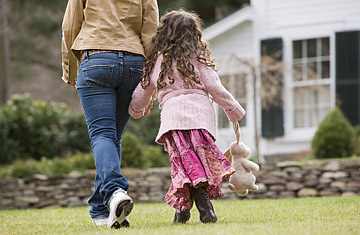
Homeownership has long been heralded as better for children. Kids raised in owned — as opposed to rented — homes show higher math and reading scores and less tendency to drop out of high school. In recent years, organizations from the National Association of Realtors to the President's Council of Economic Advisers to Habitat for Humanity have made sure to mention those sorts of findings in efforts to push more people to own houses.
But maybe the argument is flawed. New research by David Barker of the University of Iowa and Eric Miller of the Congressional Budget Office indicates that homeownership actually has little to no effect on how kids do in school. Their paper, "Homeownership and Child Welfare," which appears in the summer issue of Real Estate Economics, is drumming up interest in housing-policy circles for calling into question one of the basic rationales for encouraging people to own homes. It's yet another idea — like house prices always go up, and down payments aren't that important — being re-evaluated in the wake of the housing crash.
At first glance, data often seem to support the premise that there's an educational advantage to living in an owned home. Numbers from the U.S. Department of Education, for instance, show that elementary school students who live in owned homes consistently do better on reading and math tests than students who live in rentals. In a survey involving more than 20,000 children, first-graders in owned homes scored an average 77.3 points on a test of reading, while children in rented homes scored an average 68.5 points. That gap persisted for math scores (62.6 vs. 54.8), as well as for reading and math scores among third-graders.
The problem, though, is that the differences in the raw data went away once Barker and Miller controlled for other variables — like what language was spoken at home and whether a parent had lost a job.
Using another set of data, from the U.S. Census, the researchers tested the claim that children in owned homes are more likely to graduate from high school. By looking at homes with 17-year-olds and whether or not those kids were still in school, Baker and Miller saw a clear advantage to ownership. Children in owned homes were a few percentage points more likely to stay in school. Yet again the researchers saw that advantage dissipate once other variables were taken into account.
How recently families had moved had a particularly pronounced effect on the results. Among families that had moved in the past few years, the difference between living in an owned or rented home was significant. But as families stayed in one place longer, the difference started going away. After five years, the difference was insignificant for families living in apartments and town homes, and after 10 years, it was also insignificant for those in traditional single-family houses. "For people who have stayed put for a long time, there's really no difference between ownership and rental," says Barker. One theory about why that would be the case: moving into an owned home is more likely to signify a good event has taken place (a new job in a new town, say), whereas moving into a rented home is more likely to signify a bad turn (parents getting divorced, perhaps). Those other events are then influencing performance in school, the thinking goes, not homeownership or renting per se.
In the course of the research, Barker and Miller tested additional variables to see if they could find other things affecting educational outcomes. One variable that influenced test scores even more than homeownership: whether a family owned a car. What to make of that? Well, maybe cars are important. Or, maybe neither cars nor houses are important in and of themselves, but both are good at signaling a lack of financial strain. "If parents have income coming in, then they are more likely to be able to afford a house or a car, and that's a more regular, less stressful environment for children," says Barker.
The conclusion, then, is that policymakers probably can't bolster how well kids do in school simply by crafting programs to encourage homeownership. The $100 billion–plus in annual tax breaks and subsidies sent the way of homeowners might do many things, but helping the nation's children doesn't necessarily appear to be one of them. "You can't conclude that by making more people into homeowners you can cause all these other good things to happen," says Barker, "because maybe these people are different in the first place."
